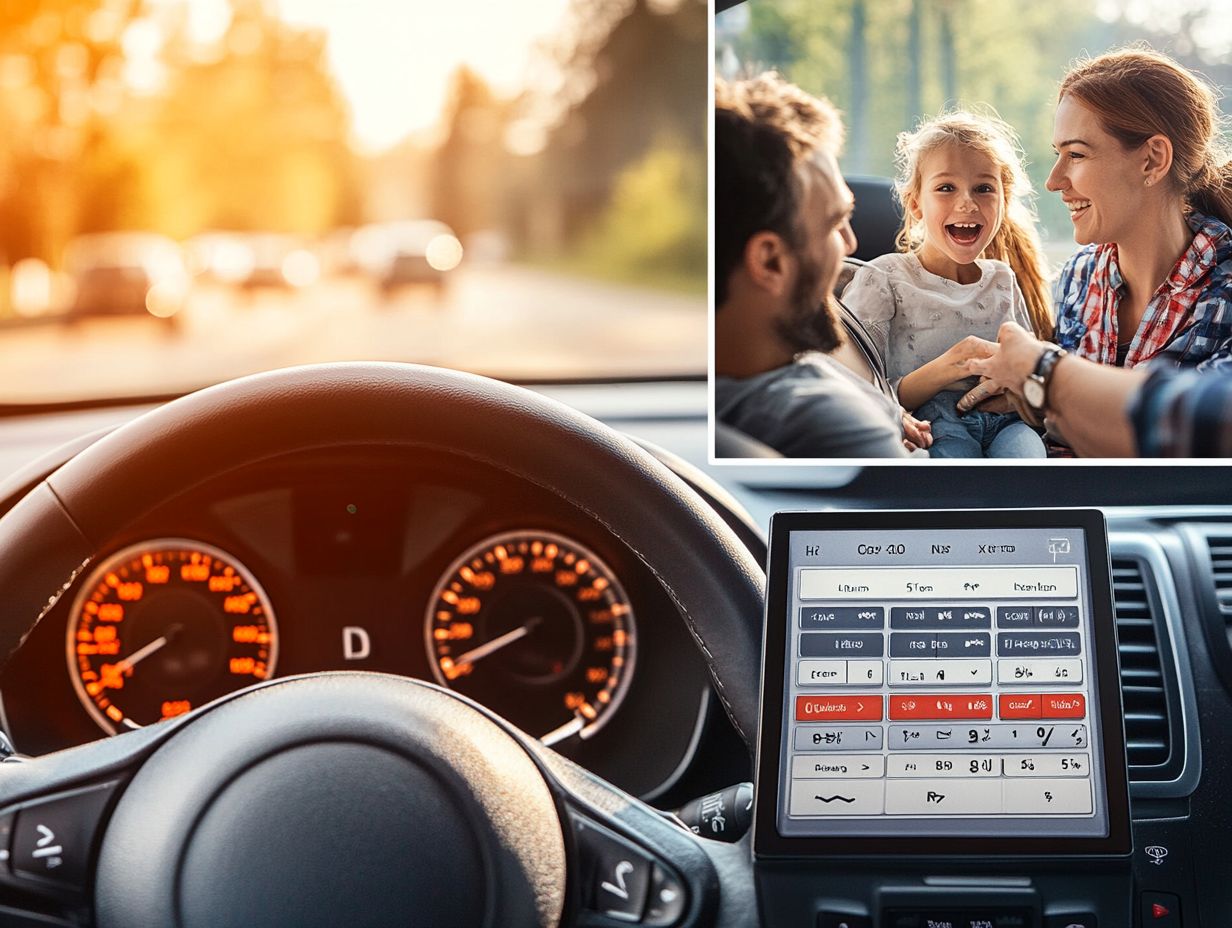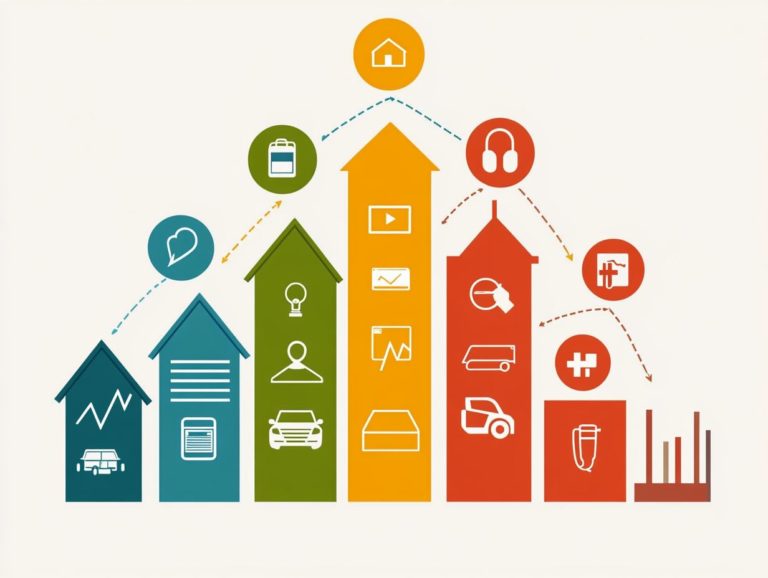What Are the Benefits of Usage-Based Insurance?
Usage-Based Insurance (UBI) is revolutionizing your perspective on auto insurance by customizing premiums to align with your unique driving behaviors.
Rather than relying on a one-size-fits-all strategy, UBI presents distinct advantages, including reduced premiums, tailored coverage, and rewards for safer driving habits.
This article explores the benefits of UBI, examining how your driving data impacts your premiums and highlighting key considerations before you make the transition.
Explore the possibilities of UBI it could be the future of your auto insurance journey!
Contents
- Key Takeaways:
- Benefits of Usage-Based Insurance
- How Usage-Based Insurance Works
- Is Usage-Based Insurance Right for You?
- Frequently Asked Questions
- What Are the Benefits of Usage-Based Insurance?
- 1. How does usage-based insurance benefit safe drivers?
- 2. Can usage-based insurance help reduce insurance fraud?
- 3. Is usage-based insurance more affordable than traditional car insurance?
- 4. How can usage-based insurance benefit young drivers?
- 5. Does usage-based insurance include tracking devices in cars?
- 6. Are there any downsides to usage-based insurance?
Key Takeaways:

- Usage-Based Insurance can lead to lower premiums, rewarding safe driving habits and low mileage.
- With personalized coverage based on individual driving behavior, UBI offers fairer coverage for drivers.
- By tracking driving habits, UBI can help improve overall driving and make roads safer for everyone.
What is Usage-Based Insurance?
Usage-Based Insurance (UBI) is a game-changer in the insurance landscape, using telematics technology (technology that collects data on your driving) to analyze your driving habits and behaviors. This enables auto insurance companies to craft policies and premiums tailored specifically to your unique driving experiences.
This new approach goes beyond traditional methods by incorporating real-time telematics data, providing a comprehensive view of your risk factors and driving patterns. By leveraging smartphone apps and telematics devices, UBI programs assess crucial metrics like miles driven, driving scores, and safe driving behaviors.
Companies like Liberty Mutual and Allstate are leading the charge, offering UBI options that cater to your personalized insurance needs. The core of this model lies in its ability to gather detailed telematics data, which may include insights into your speed, braking habits, and current traffic conditions.
While this wealth of data benefits both insurers and consumers, it raises important questions about consumer privacy. It s crucial to strike a balance between offering potential discounts and protecting your personal information.
As UBI continues to gain traction, it’s essential to discuss how insurance companies can responsibly manage sensitive data while optimizing their offerings for conscientious drivers like you.
Benefits of Usage-Based Insurance
The advantages of Usage-Based Insurance (UBI) extend beyond traditional auto insurance options, offering a unique chance to reduce your premiums while enjoying personalized coverage tailored to your specific driving habits.
By utilizing telematics data, you can track your driving behaviors, leading to improved habits and opening the door to potential insurance discounts. This data-driven approach rewards responsible driving and fosters a sense of accountability for you as a user.
Lower Premiums
One of the most enticing aspects of Usage-Based Insurance is the prospect of lower premiums. When you demonstrate good driving habits and maintain a high driving score, you can significantly decrease your insurance costs. This benefit of usage-based insurance encourages safe driving and allows insurers to align premiums more closely with actual risk levels, creating a fairer insurance landscape.
By leveraging telematics data, insurers can monitor your driving behaviors, such as acceleration patterns, braking habits, and even the times you drive. For example, if you maintain a steady speed and avoid abrupt stops, you may qualify for lower rates. Conversely, if you drive in riskier conditions like during rush hour or late at night you might not enjoy the same benefits.
Many insurance providers offer specific discounts for completing safe driving courses or for maintaining a clean driving record over time. These pricing strategies reward responsible driving, fostering a culture of safety on the roads and giving you more opportunities to save money.
Personalized Coverage
Personalized coverage is at the heart of Usage-Based Insurance (UBI), where technology that tracks your driving allows auto insurance companies to create tailored policies that align with your specific driving behaviors and risk profile. By analyzing how you drive looking at factors like acceleration, braking, and cornering insurers can offer coverage that genuinely fits your unique circumstances and needs.
This innovative approach opens the door to customizing various types of coverage, including liability, collision, and comprehensive options. With real-time data collected from your vehicle, insurers can reward you with discounts for safe driving habits. They can also adjust your premiums, which is the amount you pay for your insurance coverage, based on your individual risk factors.
The advantages of personalized insurance policies go beyond just saving money; they also foster accountability and encourage you to adopt safer driving practices. This method gives you the power to take control of your insurance costs while promoting a culture of road safety, ultimately contributing to a reduction in accidents and claims.
Improved Driving Habits

Usage-Based Insurance helps you enhance your driving habits with valuable feedback through cutting-edge technology. This encourages mindfulness about how you drive.
With access to real-time data on your performance metrics, you can pinpoint areas for improvement. This leads to safer driving practices and, potentially, lower insurance premiums.
These metrics typically encompass speed, braking patterns, acceleration, and cornering behavior all critical factors in assessing driver risk. For example, if you find yourself frequently accelerating rapidly or braking harshly, you may receive alerts indicating that these behaviors could heighten your chances of a collision.
Over time, this constructive feedback fosters behavioral changes, as you become increasingly aware of your driving habits. Technologies like mobile apps and in-vehicle devices further elevate this experience, enabling you to track your progress and receive personalized suggestions tailored to your driving style.
This ultimately creates an environment that promotes improved road safety, ensuring you drive with confidence and care.
How Usage-Based Insurance Works
Usage-Based Insurance (UBI) functions by harnessing telematics devices and data collection to monitor your driving behavior and assess your unique risk patterns. This innovative approach allows auto insurance companies to deliver more precise pricing and customized insurance options tailored specifically to you.
By keeping an eye on critical factors like miles driven, acceleration, braking, and your overall driving score, insurers can accurately evaluate the risk you present and adjust their offerings. This creates a transparent, data-driven insurance ecosystem that works in your favor.
Tracking Driving Behavior
Tracking your driving behavior is at the heart of Usage-Based Insurance, where technology captures essential metrics that shape your insurance premiums and overall risk assessment. By keeping an eye on factors like speed, braking intensity, and driving duration, insurers can better understand your likelihood of making accident claims and adjust their risk models accordingly.
These advanced technologies, which include cutting-edge telematics devices and intuitive smartphone apps, enable continuous data collection. This gives insurers the power to analyze your real-time driving habits with precision.
As a result, they can spot patterns that indicate whether you pose a higher or lower risk, allowing for informed decisions about adjusting your rates or providing personalized feedback. This wealth of data not only plays a critical role in determining your premium rates but also affects the handling of accident claims.
Driving behavior metrics can serve as valuable evidence when evaluating fault and mitigating liabilities. Ultimately, this interconnected landscape promotes safer driving habits, making you more aware of how your choices impact your insurance costs!
Factors That Affect Premiums
Several key factors influence premiums in Usage-Based Insurance, particularly your driving habits and the miles you drive. Insurers analyze data from devices that track your driving to craft a comprehensive risk profile tailored to you. They consider metrics like the frequency of hard braking, your acceleration patterns, and your overall driving score to determine your insurance rates. This clearly underscores the connection between safe driving behaviors and the financial rewards that come with them.
For example, if you consistently exhibit safe driving steering clear of sudden stops and maintaining steady speeds you’ll likely enjoy significantly lower premiums.
Understanding your driving habits can empower you! By making informed adjustments, you can enhance your habits behind the wheel. These proactive steps not only bolster your personal safety but also increase your chances of snagging premium discounts.
Review your telematics data regularly and leverage the insights it offers. By cultivating safer driving practices, you ll not only see long-term savings but also present a reduced risk profile to insurers.
Is Usage-Based Insurance Right for You?
Determining if Usage-Based Insurance (UBI) aligns with your needs requires thoughtful reflection on several key factors, such as your driving habits, your comfort level with data collection, and the type of insurance coverage you seek.
While UBI presents significant advantages like reduced premiums and tailored coverage options make sure to assess your driving behavior and the potential impact of telematics technology on your privacy before committing to a UBI program.
Considerations Before Enrolling

Before you enroll in Usage-Based Insurance, take a moment to reflect on your driving habits and your comfort level with the data collection that comes with telematics technology. It s essential to grasp how your driving behaviors can influence your insurance options and potential premium rates. Don t overlook the consumer privacy implications that might arise from sharing your personal driving data.
Assess how your typical driving patterns align with the criteria used by insurers, such as speed, braking, and mileage. If you tend to drive aggressively or have inconsistent patterns, consider how these behaviors might result in higher premiums instead of the discounts you re hoping for.
You also need to think about how much you trust your insurance provider s data safety practices. The risk of your personal data being sold or misused is real, so balancing the potential financial benefits against these privacy concerns is crucial for making a well-informed decision.
Is Usage-Based Insurance the Future of Auto Insurance?
The rise of Usage-Based Insurance (UBI) hints at a transformative future for the auto insurance industry, especially as telematics technology evolves and reshapes how insurance rates are set. By focusing on data-driven assessments of your driving behaviors and risk factors, UBI offers a more personalized approach to automotive insurance. This could mean moving away from traditional models that often result in insurance rate hikes, regardless of your individual driving performance.
This shift could work to your advantage, allowing you to benefit from lower premiums directly tied to your driving habits, rather than being lumped into a generalized risk pool. With telematics integration, insurers gain access to detailed insights into your driving patterns think speed, braking, and even the time of day you hit the road. Responsible drivers like you could enjoy significant savings, while those engaging in risky behaviors might find themselves encouraged to adopt better habits.
UBI is paving the way for a fairer insurance landscape, where policyholders are rewarded for their choices. This not only enhances road safety but also boosts satisfaction among consumers, making it a win-win situation for everyone involved.
Frequently Asked Questions
What Are the Benefits of Usage-Based Insurance?
Usage-based insurance means you pay based on how you drive, rather than a flat rate. This type of insurance allows drivers to pay for their car insurance based on their actual driving habits. The premiums are determined by how much the car is used and the driving behaviors of the driver. Here are some benefits of usage-based insurance:
1. How does usage-based insurance benefit safe drivers?
Safe drivers usually pay more because they are grouped with those who have accidents or violations. With usage-based insurance, safe drivers can save money since their premiums reflect their actual driving habits.
2. Can usage-based insurance help reduce insurance fraud?

Yes, usage-based insurance can help reduce insurance fraud. Since premiums are based on actual driving behaviors, drivers are less likely to lie about their habits to get a lower premium. This encourages safer driving habits, leading to fewer accidents and less fraud.
3. Is usage-based insurance more affordable than traditional car insurance?
In most cases, usage-based insurance can be more affordable than traditional car insurance. Insurance companies offer discounts to drivers who exhibit safe driving behaviors, such as obeying speed limits, avoiding sudden braking, and driving during off-peak hours.
4. How can usage-based insurance benefit young drivers?
Usage-based insurance can be especially beneficial for young drivers who may face high premiums due to their lack of experience. By understanding what usage-based insurance coverage is, they can demonstrate safe driving habits and receive lower premiums as a result.
5. Does usage-based insurance include tracking devices in cars?
Yes, most usage-based insurance policies require a tracking device to be installed in the car. This device collects data on driving habits and determines the premium. The data is used solely for insurance purposes and is not shared with anyone else.
6. Are there any downsides to usage-based insurance?
One potential downside is that usage-based insurance may not suit drivers with irregular driving habits. Drivers who use their cars less might miss out on big savings. Additionally, some may feel uncomfortable with the idea of a tracking device in their car, even if the data is only used for insurance purposes.
Why pay more? Switch to usage-based insurance today and start saving!
Ready to save? Check out usage-based insurance plans today!





